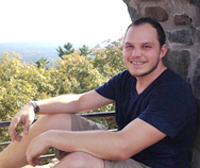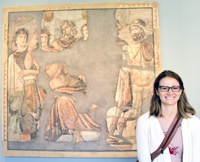Archaia-Supported Graduate Student Initiatives
If there is an initiative you think Archaia should support, please be in touch with the co-chairs and with program administrator Keith Mazzadra (keith.mazzadra@yale.edu)
The Ancient Judaism Workshop
An Ancient Judaism research workshop, intended to offer a setting for graduate students to share their current research with their fellow graduate students. This workshop allows a sense of academic sharing within the program and offers a suitable setting for students to present their work for evaluation and feedback before presenting their work to the larger academic community. The workshop also invites faculty members to share with the workshop’s participants some of their most recent research projects, in order to allow a vibrant atmosphere for academic discussions among faculty and graduate students. The workshop occasionally invites participants from other universities to share their recent academic findings, especially if the person in mind has recently completed a research project of interest to the participants of the workshop.
The Archaia Forum
The Archaia Forum is an interdisciplinary working group for graduate students who take the distant past as their object of study. During the Fall term, we will meet five times in Phelps 401 in order to discuss key themes and current trends in interdisciplinary study of the premodern world in a workshop format. Each week will cover one theory or trend that multiple disciplines share in their study of individual regions and time periods. Past years’ themes have included the integration of history and the hard sciences, defining the “premodern”, and cross-disciplinary approaches to genre. During the Spring term, over the course of another five meetings, we will focus on the sharing of original research by participants, with priority given to work-in-progress presentations by graduate students completing capstone projects for the Archaia Qualification. Our scope for the term “premodern” is broad: we welcome students of cultures across the globe and periods across the ages to share their approaches to the past.
The Late Antiquity Reading Group (LARG)
The Late Antiquity Reading Group (LARG) at Yale invites all students, faculty, and members of the public who are interested in late antiquity to gather together. We discuss common, pre-circulated works in progress or recent publications in the field. Often, guest scholars join us to discuss their new work.
Materials for each discussion will be circulated three to four weeks in advance. We ask that you read the material in advance of each meeting. To be added to the group’s mailing list or to receive the materials for our next meeting, please register at this link. Contact co-organizers Austin Goodwin Andrews (austin.andrews@yale.edu) or Jake Horton (jacob.horton@yale.edu). You can also join LARG’s Facebook group to stay up to date on upcoming events.
Co-organizers: Austin Goodwin Andrews and Jake Horton
Faculty Advisors: Maria Doerfler and Noel Lenski
LARG is made possible through the generous support of Archaia, the MacMillan Center, the Yale Program of Jewish Studies, the Yale Divinity School, and the Yale Departments of Religious Studies, Art History, Near Eastern Civilizations and Languages, and Classics.
Some of our Alumni
Elizabeth “Lizzy” Hane
Ph.D. Student in Religion (Religions of Mediterranean Antiquity), Princteon University
2024 MARc (New Testament), Yale Divinity School

The Archaia program is a gem in Yale’s departments in the premodern world. I came to YDS interested in interdisciplinary work between classics and religion. Archaia, however, allowed my interests to bleed into one another. I discovered a rich love for material and visual culture in the late antique world, and Archaia’s emphasis on connecting with graduate students and faculty members across the university helped me grow that interest into internships at the YUAG and Dumbarton Oaks. Archaia’s generous funding of Professor Laura Nasrallah’s spring 2023 travel seminar “Archaeology of the Roman Empire” also took me abroad (for the first time!) to Greece and Türkiye, where I was finally able to see firsthand the ancient remains which I study.
The program’s greatest strength is its ability to lean into the messy, intertwined worlds of antiquity. The spring 2024 core seminar “Ancient Musical Thought” helped me reconceive the ways in which I conceptualize spoken components of spells, hymns, and prayers. The conversations I have had in both that seminar and the Archaia Forum have helped me become a better, more precise speaker at conferences and workshops. Now a PhD student at Princeton University, I know Archaia has given me the tools to communicate effectively with other pre-modernists, no matter their disciplinary focus
Carl “CJ” Rice
Visiting Assistant Professor of Greek and Roman Studies at Vassar College
 2023 Ph.D. in The Combined Program in Classics and History, Graduate School of Arts and Sciences
2023 Ph.D. in The Combined Program in Classics and History, Graduate School of Arts and Sciences
I have been working at Vassar College in Poughkeepsie, NY since finishing my Ph.D. in ancient history at Yale in 2023. I had completed the Archaia certificate in 2019, and the interdisciplinary thinking and frameworks at the heart of the program have informed my teaching and scholarship since. For instance, my current monograph project (based upon my dissertation) seeks to bring together analyses grounded in my inter- and multi-disciplinary training in classical philology, historical inquiry, and early Christian studies, with perspectives on citizenship and exclusion from political science and legal scholarship. At Vassar, I have also sought to embrace inter- and multi-disciplinary approaches in my teaching. This past spring, for example, I taught a seminar titled “The End of the Ancient World: Late Antiquity in Context.” While much of the class focused on the late Roman empire in the Mediterranean between c. 200-700 CE, my students and I also reflected upon what was happening elsewhere in Eurasia and Africa at that time. In an advanced Latin course I taught last fall, my students applied queer theoretical approaches to reading the Historia Augusta’s Life of Elagabalus to think about what exactly it meant for the author to “code” Elagabalus as “queer” in the many ways they did. They presented their work at an immensely-successful end-of-semester colloquium that was attended by people from all across Vassar’s campus. This spring, I will be teaching a seminar on ancient slaveries that will feature a healthy dose of the comparative and multidisciplinary analyses at the heart of the Archaia program. At present, I am working on an article that examines the distinction between enslaved and free in late Roman lawmaking about religion, a new translation of an early fourth-century anti-Christian legal text, and the aforementioned monograph.
Dr. Nicholas Kraus
Fritz Thyssen Research Fellow, Institut für Altorientalistik, Freie Universität, Berlin
2018 Ph.D., Assyriology
Dissertation: “Scribal Education in Sargonic Mesopotamia”
 The Archaia program is an excellent complement to graduate studies in ancient and premodern fields at Yale. It provides a chance to interact on a regular basis with other graduate students and faculty from a diverse array of departments, and to study ancient cultures outside one’s primary focus. Participating in Archaia’s central component, the Core Seminar, greatly enriched my graduate experience at Yale, giving me new perspectives on my work and prompting me to think about my research within a larger historical framework.
The Archaia program is an excellent complement to graduate studies in ancient and premodern fields at Yale. It provides a chance to interact on a regular basis with other graduate students and faculty from a diverse array of departments, and to study ancient cultures outside one’s primary focus. Participating in Archaia’s central component, the Core Seminar, greatly enriched my graduate experience at Yale, giving me new perspectives on my work and prompting me to think about my research within a larger historical framework.
I also profited a lot from participating in the Archaia field trip. The trip is another great opportunity to learn about the ancient world and meet other graduate students at Yale and abroad. The experience of visiting ancient sites and museums and simultaneously have lively and engaging discussions was unforgettable, and I cannot recommend such an opportunity enough. I found that placing myself in a physical location outside of a classroom, while being able to learn about and interact with ancient materials, made me more conscientious of the fact that the materials I work with are not only historical documents but also physical objects. The experience enhanced my doctoral research and still informs my research today.
For the past year, I have worked as a Fritz Thyssen Research Fellow on an edition of a lexical list from third millennium Mesopotamia at the Freie Universität in Berlin. In the coming two years, I will continue this work, and put it in a broader historical context, as a Humboldt Scholar. I cannot be sure that having obtained the Archaia Qualification helped me receive these two grants, but I would not be surprised if it did.
Jennifer Weintritt
Assistant Professor of Classics, Northwestern University
2019 Ph.D., Classical Philology
Dissertation: “Troy Story: The Greek Epic Cycle in Latin Epic”
 Thanks to Archaia, I’m starting my first year on the job with three projects that have interdisciplinary appeal on my docket. The driving idea behind my dissertation, that narrative continuation can be used to shape literary canons, first took shape in an Archaia seminar on theories of authorship and canon. That same seminar also planted the seed for my capstone project, a comparison of the rhetoric of translation in a Latin text and Hellenistic Jewish text, which I am developing into an article. Over time, I collected case studies from Archaia seminars, lectures, and the summer study tour in Iceland to design an interdisciplinary course on global classicism, featuring units on Japan and Scandinavia. I had the opportunity to teach this class at NYU in my sixth year, and I expect it will be one of my regular offerings at Northwestern.
Thanks to Archaia, I’m starting my first year on the job with three projects that have interdisciplinary appeal on my docket. The driving idea behind my dissertation, that narrative continuation can be used to shape literary canons, first took shape in an Archaia seminar on theories of authorship and canon. That same seminar also planted the seed for my capstone project, a comparison of the rhetoric of translation in a Latin text and Hellenistic Jewish text, which I am developing into an article. Over time, I collected case studies from Archaia seminars, lectures, and the summer study tour in Iceland to design an interdisciplinary course on global classicism, featuring units on Japan and Scandinavia. I had the opportunity to teach this class at NYU in my sixth year, and I expect it will be one of my regular offerings at Northwestern.